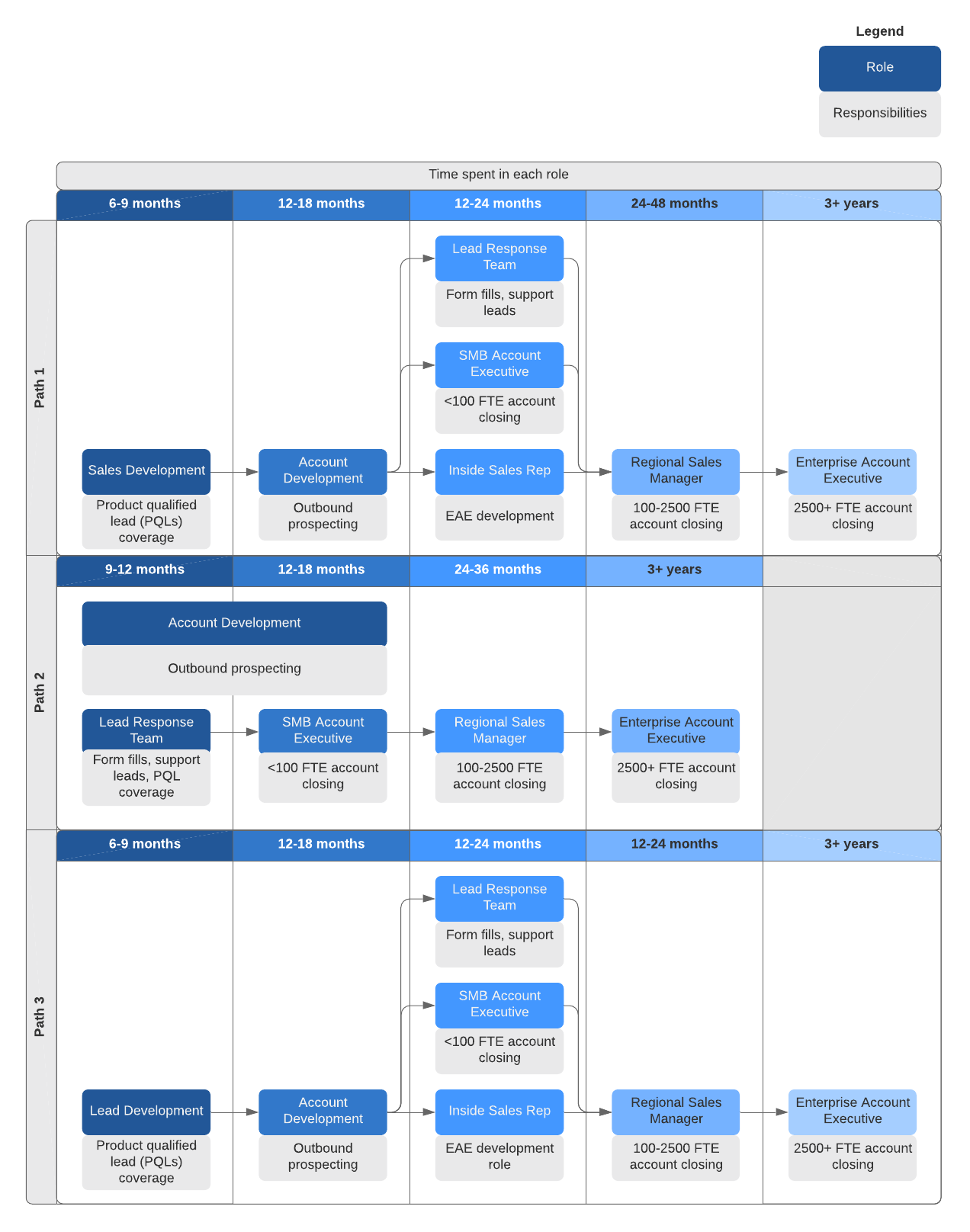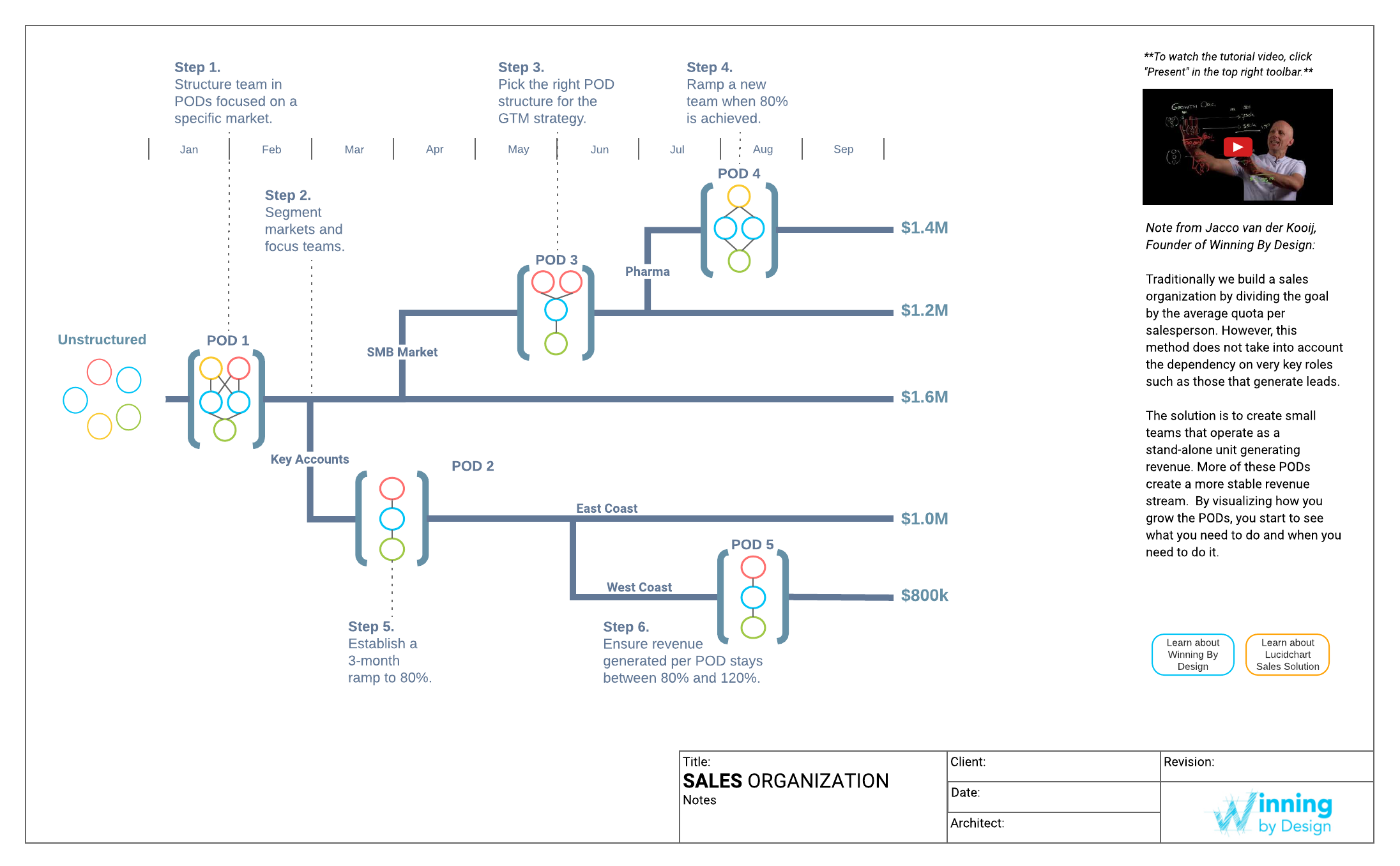A beginner's guide to a software sales career path
Lucid Content
Reading time: about 8 min
Topics:
Have you ever considered a career in technology sales? Have you ever wondered the starting salaries, average salaries, and elite salaries of tech professionals in software sales? While sales positions have been around since the advent of commerce, the data on the software sales career path is comparatively brand new, with new roles, new information, and new opportunities appearing as quickly as the Internet and associated technology is developing.
Few careers have as much potential for advancement as that of a software sales professional. Several billionaires and tech investors, including Donald T. Valentine, Larry Ellison, and Mark Cuban, all began their careers in technology sales. With the explosive growth of emerging tech in health, energy, and media, a role in sales is not only a chance to become immersed in a high-value field but also a chance to dramatically elevate your earning potential.
But first, let’s get at how to get into software sales.

What is software sales?
The most elite sales professionals are best thought of as advocates: Their role is to advocate on behalf of the company whose product or service they are offering—but also on behalf of their potential client or customer in order to find the best solution. The same applies to the SaaS sales process.
In software sales, your primary responsibility is to provide your prospective client with technology that will help them to solve a problem.
While the goal of having your product or service in the hands of as many satisfied clients as possible remains, the way to achieve that goal relies on a variety of positions within the larger sales framework.
Types of sales positions
Is software sales a good career? Here’s a list of the different types of sales positions, including what to expect, how the SaaS sales salary for some prominent roles compares (based on data from The Bridge Group), and how you can advance to other sales roles.
Sales development rep
Description: All sales strategies require a way of building new potential client relationships. A sales development rep (SDR) is responsible for cold-calling new potential clients and creating an opportunity for said clients to meet with company sales people or AEs.
Average base salary: $48,000
Average total compensation: $75,000
Pros: The SDR role is the best path to an actual sales role, where there’s more upside potential for commission-based earnings.
Cons: Lower starting pay than account exec; lower potential for higher earnings and commission
Opportunities for advancement: SDR to AE or sales manager
Outside sales rep
Description: Outside sales reps can be thought of as AEs who build relationships in outside markets, often never reporting to the main office of their company. For example, a New York-based firm may choose to hire a Hong Kong-based outside sales rep to build client relationships in the Asian market. Outside sales reps report to sales managers or the VP of sales, depending on the size of the company.
Pros: Because the work is done off-site and sometimes remotely, there is no office to report to or coworkers to compete with. Distance from the main office also allows lots of independence, giving you schedule freedom as long as you’re hitting your quota.
Cons: Slightly lower average starting salary than an account executive
Opportunities for advancement: Outside sales reps can transition quite well to AEs or sales management.
Account executive
Description: Account executives (AEs) exist in companies in virtually all industries, and the role of a SaaS AE is to liaise with potential clients and close deals. AEs are central to the success of any growing organization: The client relationship growth is dependent on the account executive’s ability to successfully advocate for the needs of the client while representing their company’s ability to provide those needs.
Average base salary: $62,000
Average on-target earnings: $126,000
Pros: Good starting salary; lots of opportunity for upward advancement with commission earnings and sales bonuses; skills development in client-facing sales interactions
Cons: Success rate depends heavily on the quality of the product/service; commission-based salaries could be undependable
Opportunities for advancement: A successful AE can go on to sales management, or even to VP of sales, depending on the size of the company and breadth of competition.
Post-sales account manager
Description: After a deal has been closed, a post-sales account manager steps in to maintain the client relationship, work to renew contracts, and upsell on existing contracts. This role will even be responsible for reporting bugs to engineers to make sure their clients are able to use a product effectively.
Pros: Post-sales account managers have a wide range of responsibilities, from maintaining relationships to engaging in sales to working with developers to fix any bugs related to software. They also earn a higher average starting salary than AEs, outside sales reps, or SDRs.
Cons: While there is still opportunity for commission-based earnings increases, there is generally a lower cap on earnings because post-sales account managers aren’t in a direct sales role.
Opportunities for advancement: Post-sales account managers can advance to excellent sales managers or VPs.

No matter what sales role you choose, learn the essential skills you'll need to succeed.
Read moreSales manager
Description: Sales management roles generally only exist when a company has reached a certain size. Sales managers oversee their sales teams and are usually well-performing salespeople themselves. Additionally, while a VP of sales is responsible for crafting a sales strategy, sales managers are responsible for executing it, training and managing their respective sales teams, monitoring their progress, and reporting back to a VP of sales.
Base salary: $89,000 to $95,000
On-target earnings: $127,000 to $147,000
Pros: Great starting salary and great earning opportunity from commission
Cons: Less client-facing work and more company oversight
Opportunities for advancement: A great sales manager may advance to sales leadership, including VP or head of sales.
VP of sales
Description: As an executive, a VP of sales (also called head of sales) is responsible for the sales of the entire company. Their main role is to implement a sales strategy that maximizes the success rate of each individual salesperson but will also work closely with marketing to ensure that any marketing plan is informed by sales strategy and vice versa. At smaller companies or startups, the VP of sales may also hire other salespeople and even manage sales teams. At larger companies, the VP of sales oversees sales managers.
Pros: Great starting pay and great average pay, with lots of upside for commission-based earnings. A VP of sales can also transition laterally within the company due to their leadership experience.
Cons: VPs of sales have higher responsibility—if a SaaS product is underselling than the head of sales is usually directly to blame. This reality can lead to a lot of turnover in the position.
Opportunities for advancement: VP of sales can transition well laterally to other executive positions like CFO or CEO. Because of their knowledge base on software and related tech, along with leadership ability, VPs of sales can go on to lead of found their own companies as well.
Sales operations
Description: At larger companies, support staff for sales teams is required. Sales operations is responsible for making sure sales are running smoothly, perhaps providing proper marketing materials, evaluating processes, or reporting to sales leadership.
Pros: People working in sales operations on average earn a great starting salary.
Cons: Little or no opportunity for commission-based earnings increases or bonuses.
Opportunities for advancement: Because they are involved in sales processes, an experienced sales operations leader could advance into sales leadership, crafting SaaS sales strategies as a VP of sales.
Sales engineer
Description: Because SaaS requires complex technical processes, an engineer may sometimes accompany sales teams to answer any technical questions about a software product or service. This person is known as a sales engineer.
Pros: Sales engineers may earn as much as software engineers in their base pay. Because of their contribution to the sales process, some companies also offer commission to sales engineers.
Cons: Because sales engineers aren’t in a direct sales position, not all companies may not offer commission on the sales they are involved with.
Opportunities for advancement: Sales engineers with people skills can make excellent AEs and sales managers. Experienced sales engineers, because of their technical expertise and sales experience, may go on to be great executives, including CTOs, CROs, or CEOs.
Because the tech sector is expanding rapidly, SaaS sales salaries are likely to expand with it. At any rate, a tech sales career is one sure to offer challenging work, continued education, and explosive growth potential.
Note: If you're a sales leader trying to decide how to structure your sales organization and create fulfilling careers for your team, make sure to read our blog and check out our exclusive templates from Winning by Design.

Visualizing your software sales career path
Career advancement requires a commitment to a vision. The most successful software sales professional is one who has a clear idea of where he or she is and a clear vision of where he or she is going. SaaS sales roles are rapidly growing alongside the SaaS industry, and staying ahead of trends and abreast with advancement is the best way to hone your skills as a sales professional, or find the sales roles that are in line with your career goals.
Combining diagramming, data visualization, and collaboration, Lucidchart is used by sales professionals to map out organizational hierarchies, sales processes, industry trends, and even new sales positions. Learn more about Lucidchart for sales or sign up for an account to try it out for yourself.
About Lucidchart
Lucidchart, a cloud-based intelligent diagramming application, is a core component of Lucid Software's Visual Collaboration Suite. This intuitive, cloud-based solution empowers teams to collaborate in real-time to build flowcharts, mockups, UML diagrams, customer journey maps, and more. Lucidchart propels teams forward to build the future faster. Lucid is proud to serve top businesses around the world, including customers such as Google, GE, and NBC Universal, and 99% of the Fortune 500. Lucid partners with industry leaders, including Google, Atlassian, and Microsoft. Since its founding, Lucid has received numerous awards for its products, business, and workplace culture. For more information, visit lucidchart.com.
Bring your bright ideas to life.
By registering, you agree to our Terms of Service and you acknowledge that you have read and understand our Privacy Policy.